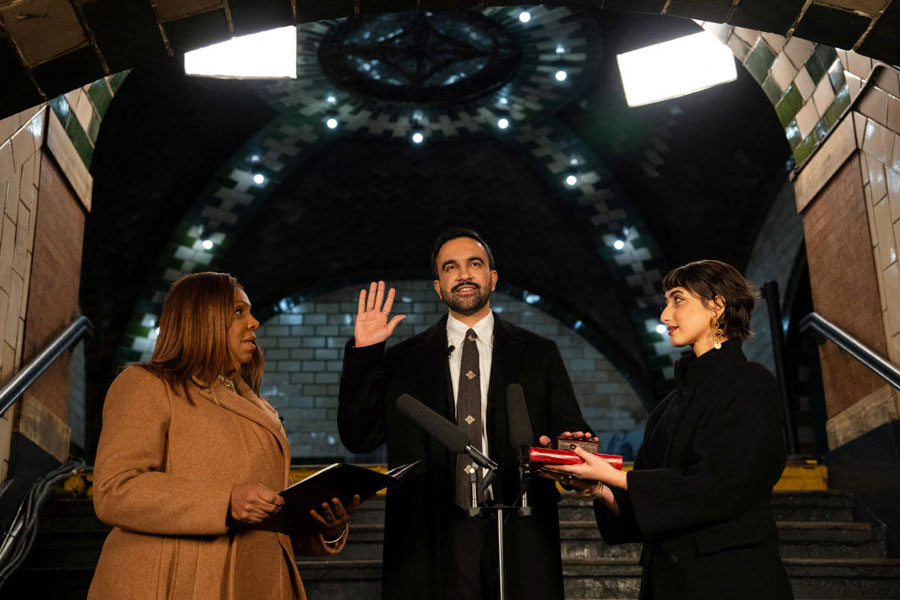.jpg)
Rani Mukerji’s Hichki, now playing in theatres, is loosely based on the life of Brad Cohen, an American educator and motivational speaker. Cohen was just 10 when he was diagnosed with Tourette Syndrome. A teacher for over two decades, Cohen co-wrote Front of the Class: How Tourette Syndrome Made Me the Teacher I Never Had. In an interview conducted over Skype and email, t2 asked Cohen about Hichki and why he wanted to become a teacher.

What was your reaction when you got to know that someone was making a Bollywood film on your life?
It was just so unexpected! I couldn’t believe that someone from Bollywood would want to tell my story. I was excited that my story would hopefully inspire millions of people in India. Honestly, though, the bigger surprise for me was that an actress was going to be playing me! (Laughs)
Were you aware of Hindi films before this?
Not much. I had seen Slumdog Millionaire about 10 years ago. I don’t watch too many films because it’s hard for me to sit in a movie theatre. I don’t want to disturb others during a film, so I just don’t go to the movies.
What was your first interaction with Rani Mukerji like?
It was great. She is really approachable and she wanted to learn more about my life and dealing with Tourette Syndrome. She wanted to know the tics that I had and what was going through my head when the tics happened. She wanted to truly live the moment of what it was like living with Tourette.
Did you have any do and don’t for the writers or for Rani?
What I wanted was for them to stay true to the theme of my story. I didn’t want them to overact the Tourette, because then it would come across as fake… like a joke. I wanted them to treat the medical condition with respect.
What do you hope the audience takes away from the film?
I hope the audience walks away knowing that you can follow your dreams despite the challenges you may have in life, much like I was able to follow my dream to become a teacher. We all have ‘hichkis’ in life, but we need to overcome them and be a better person because of them.
Also, teachers and people who work with children need to be positive role models. They have to be that one person who is always going to be there for a child when no one else is going to support them. This is just a reminder that teachers have a powerful job and responsibility and to the world that educators need respect.
When were you diagnosed?
I was around 10 then. I started making noises and having tics. The more I did that, the more my parents realised that this wasn’t going to go away. Eventually we learnt that it’s Tourette Syndrome, a neural disorder. It was hard. We tried to educate people, but they didn’t want to listen. They thought my mom was making up stories about why I was making these noises. And it’s not like I could will myself to not make the noises. It gets worse when someone tells me to stop making the noises, when I am nervous or in an uncomfortable situation.
In your book, you mention that you knew early in your life that you wanted to be a teacher. What made you pick that as a profession?
I wanted to be that teacher I never had. So many times in my life the teachers didn’t want to deal with me because they saw me as a problem child. This was not the case. I just wanted to be treated like every other child with respect. I was motivated to become a teacher to help other kids who were like me.
Like we see in the film, many schools rejected you. Did you have a moment where you thought ‘this is too hard’?
Of course, I had many times when I was ready to give up. I would be driving away from my interviews and crying in the car. I knew I could do the job, but no one was giving me a chance. But deep down, I knew I could not allow this to happen. I didn’t want Tourette to win. So, I would start off the next day with renewed hope.
Do you remember what your first day as a teacher was like?
I was so excited! After 25 rejections, I had finally got a job as a second grade teacher. I remember walking down the hallway and into my classroom. I knew that my first lesson was to teach the kids that they could follow their dream just like I had.
You’ve been a teacher for 22 years now. Are kids better at understanding inclusion than adults?
Absolutely! Kids are compassionate and have empathy towards others. Adults are often quick to judge people and have preconceived notions about things in life. Hopefully, this movie will help people be more understanding about the less fortunate.
What’s the one advice you always give people with special needs?
Never give up! Just because you are different, don’t allow your medical condition to define the person you want to be. Go out there and follow your passions in life and be the best person you can be!
Karishma Upadhyay

.jpg)









